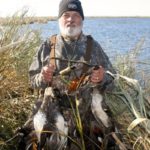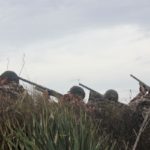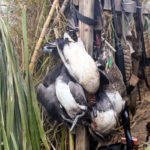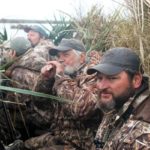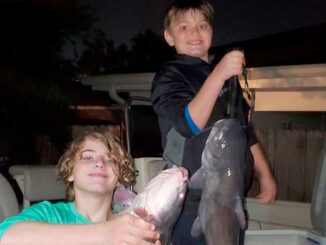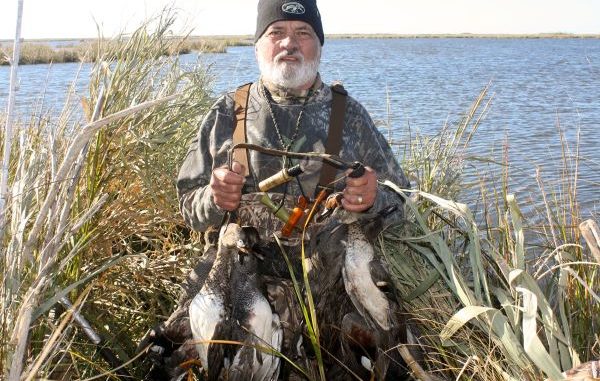
In today’s fast-paced duck hunting world, Errol Dennis Sr. directs his family’s hunting as if he were back in the old days. And they’ve mastered the art of killing late-season ducks.
“I was born in 1940. Things were a lot different back when I was growing up as a kid on Delacroix Island. There was no electricity or running water.”
Errol Dennis Sr.
I was fortunate to be invited to duck hunt with the Dennis family last January. In the blind that morning, were three generations of Delacroix duck hunters who have carried on the family’s duck-hunting traditions on property that has been in their family for almost 100 years.
The Dennis family hunting legacy goes back many years, as recalled by Errol Sr.
“My daddy duck hunted for market before I was born,” he said. “He would only shoot French ducks and pintails, which he would sell to restaurants in the French Quarter, and which was legal back then.
“Once I got old enough to hunt, we would all go out on a lugger into the marsh for days at a time. Everyone had their own pirogue, and each of us would paddle to a pond, sometimes miles (away), where we wanted to hunt and we would put out a few homemade decoys.
“We didn’t use duck blinds; we would just push the pirogue into the marsh and bend over the three-corner grass to hide the pirogue.
“We would always hunt a crosswind and wait for the ducks to pass us; then we would shoot them while still sitting down in the pirogue. They never knew we were there.”
It was a far cry from today’s hustle-and-bustle duck hunting, he said.
“Everything is different now,” Errol Sr. said. “People are in such a big hurry, and just want to come out here and kill ducks as quick as they can and leave, instead of taking the time to appreciate it all.
“Just being out here on our own land with my sons and grandson, paddling the pirogues that we build and hunting ducks — that’s what it is all about.”
When asked how things have changed since he was a youngster growing up on Delacroix Island, he looked out over the marsh with sad and piercing eyes.
“The beautiful marsh that was here when I was a kid is all but gone now,” Errol Sr. lamented. “Years of erosion, subsidence and storms have opened everything up. What used to be small ponds have turned into lakes and bays.
“I never thought as a kid it would ever be like this.”
At 75 years old, Errol Sr. has seen his share of changes.
The family home in Delacroix that survived Hurricanes Betsy, Camille and so many others was no match for Hurricane Katrina in 2005. Only an empty lot remains where the family house once stood.
The boat house, on the bayou side of the road, was rebuilt after Katrina and now has four lifts for the boats they use for duck hunting and fishing, all built by hand.
But on this morning, we were there to hunt ducks, not just talk about days gone by. It was late in the season, and the early teal and juvenile gray ducks of November were now only a memory, replaced by seasoned and wary survivors.
Most of the ducks we would see that morning would not be fooled, but for the dean of Delacroix duck hunters, class was now in session.
Blind selection
The dean’s class began with selecting the best location for the morning duck hunt. Errol Sr. chose to set up in a large lagoon with an island in the middle that had a natural brush blind that seemed to disappear into its surroundings.
It was large enough to hide the five hunters, which included his two sons Errol Jr. and Scott, and his grandson Pierce.
“It’s late in the season and ducks like to be out in open water, away from danger,” he said of his choice. “This is a blind that we have had for years and one of the most productive late in the season. We have a crosswind today, which is perfect.
Decoys
Errol Jr., and Scott were in charge of the decoy placement.
Each in a pirogue, they set several dozen decoys in a split spread with about half of the blocks to the right and the rest to the left, leaving an opening in the middle of the two rafts of decoys as a landing zone.
Different species of duck decoys were carefully clustered in loose groups. The spread looked like a raft of late-season ducks, comfortable and relaxed.
“We like to use a lot of decoys out on this open water,” Scott explained after entering the blind. “We use several different species common to the area like teal and gadwalls with a handful of mallards and pintails to help our chances if those are within calling range.
“We also separate the different decoys into groups.”
Shoot sitting down
As legal shooting time arrived, the dean continued his tutelage.
“Let the ducks pass the first group of decoys, and try to take them without standing up,” Errol Sr. whispered. “As soon as you stand up, they are going to flair. It you stay sitting down, you get the first shot at them while they are still cupped.”
As he was speaking, we were surprised by a large group of green-winged teal that zoomed in over the left side of the blind, making their unmistakable whistling sound.
Our first flight of the day was nearly out of range before three quick shots sounded, splashing two teal past the decoys.
“I told you we would be shooting them sitting down,” the dean said with a giant grin and belly laugh. “We didn’t even have a chance to stand on those if we wanted to.”
Natural calling
As the morning progressed, several flocks of high-flying grays carefully inspected the decoys. All of the Dennis family members were excellent callers, and complement one another as they melodically called to the birds using a variety of calls and whistles.
They had to work hard this morning, as the late-season gray ducks had already heard it all.
The gray ducks would make lazy swings over the pond, staying well out of gun range, and most flocks would eventually drift off without committing to the decoys.
Some flocks skirted within the outer reaches of gun range, and we were able to take a few that happened to get a little too close.
“These late-season ducks are smart,” Errol Sr. said. “They have been down here since November and know where all the blinds are. They are decoy and call shy, which makes hunting them tough.
“The best thing you can do at this time of year is to try and call as little as possible, and use more whistles and short quacks — nothing loud.”
Don’t be particular
Even though the gray ducks were a little uncooperative, there were quite a few scaup around to keep us on our toes.
They came in fast and low over the decoys in tight groups and provided us with consistent action throughout the morning.
There was some missing, and good natured laughing and ribbing. Everyone was having a great time.
“We almost always have dosgris late in the year,” Errol Sr. said with a grin. “They are fun to shoot, especially when the other ducks are not flying. We are not that particular — we like to shoot our guns.”
Old-school
Before we called it a day, I had some time to speak with Scott about how they do things differently than most hunters in the area.
“We are old-school: We build our own boats and pirogues, and still use outboard motors and paddle into our ponds, like we did before everyone had shallow drive motors,” he said. “We build our blinds using natural grass, and keep them freshly brushed throughout the season. We do not use boat blinds.
“We keep our calling soft and natural, and use a lot of different calls like whistles, teal calls and gadwall calls. Our decoys are grouped naturally in clusters. We believe in keeping everything as natural as possible.”
Their formula for duck hunting has been time tested, and they have mastered it.
During the course of our hunt, it was obvious this family has a unique connection with the past and their heritage. Deeply rooted in them was a respect and appreciation of all that had been given to them by those who carried out these traditions and passed them on to them. Duck hunting is much more than a sport or pastime for this family.
“We have been blessed in our family to have my dad, who taught us how to hunt, fish and enjoy what we have been given,” Errol Jr. said. “We can never take this for granted. It is important to cherish each hunt because we know that nothing is forever.
“Being able to bring my son out here, and see him enjoy hunting and spending time with his grandfather is what is most important to me. Shooting ducks is lagniappe.”
Editor’s Note: Errol Dennis Sr. can be contacted at Paw Paw’s Pirogues at 504-908-2408 or www.pawpawspirogues.com; Scott Dennis can be reached at Fanny’s Family Guide Service at 504-442-0290.
